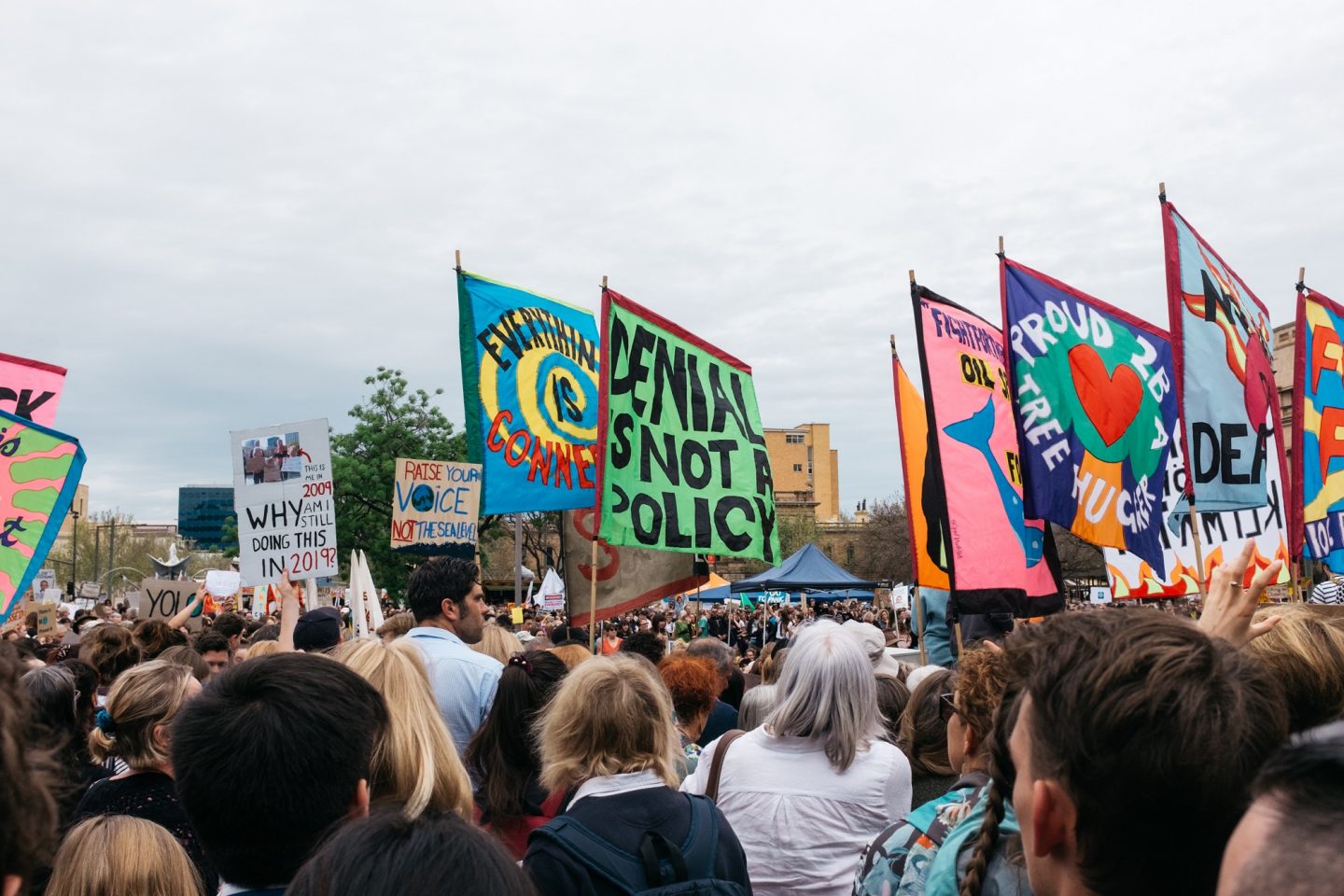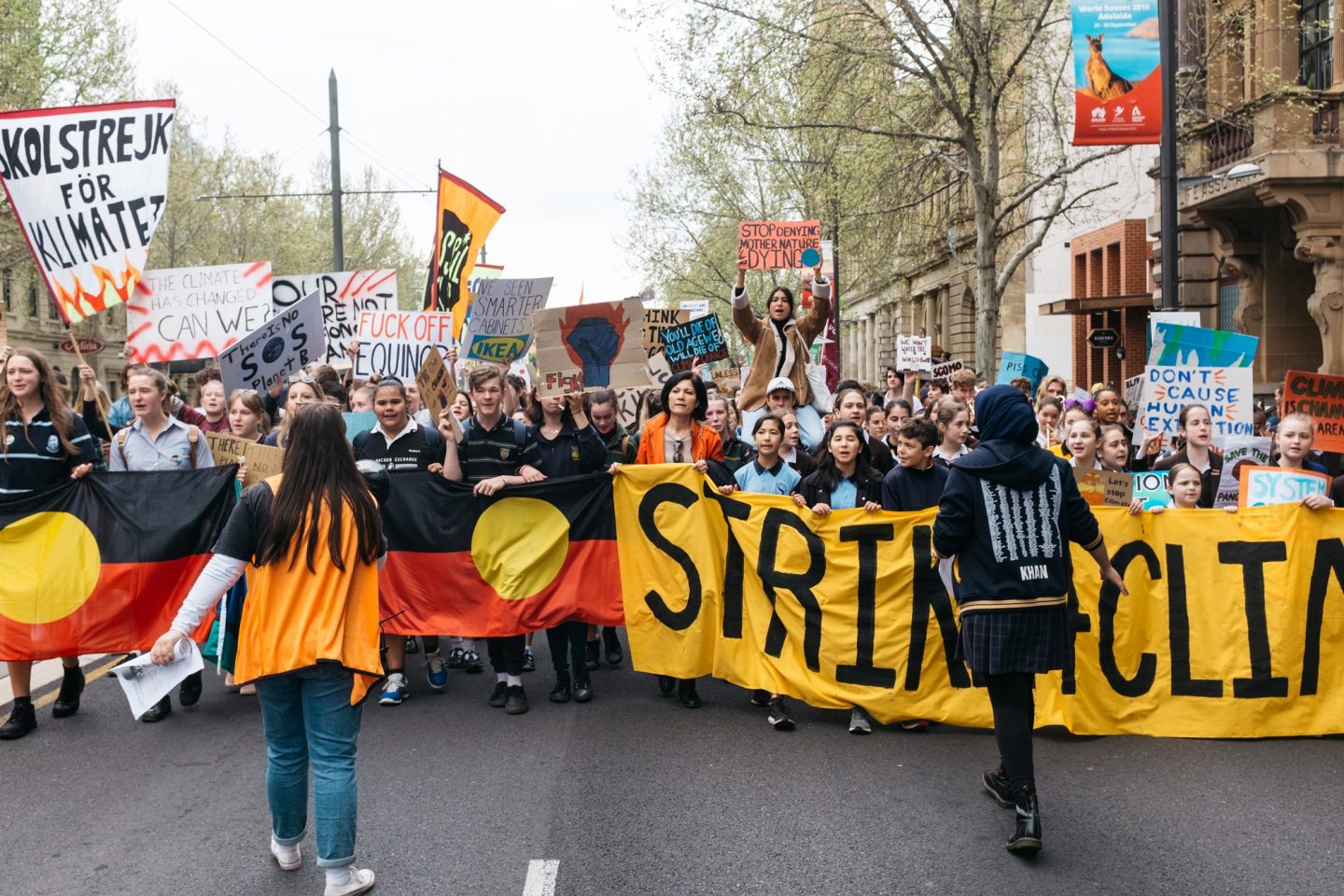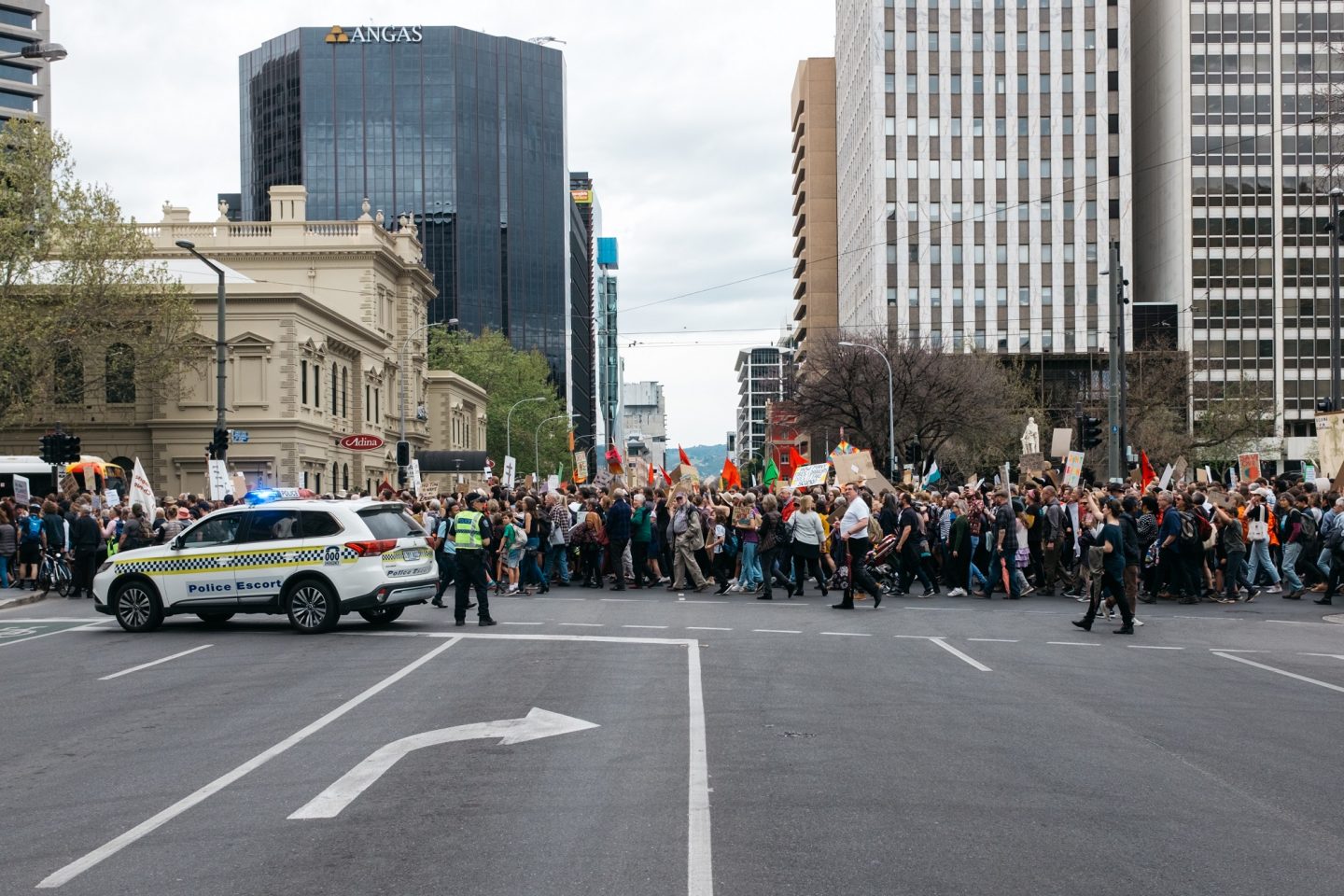Children are often a convenient plaything in modern politics, used as a moral shield for any number of more pointed political agendas. In all those debates, the actual voices and perspectives young people are rarely afforded the same weight.
Walking into the centre of the CBD, that voice comes through loud and clear as a short, skinny adolescent in a hi-vis vest politely but firmly yells, “We are at capacity, please move off to the left of Tarntanyangga!”. Outside of 3.30pm zebra crossing duty, it’s unusual to see people so young dressed in bright orange and confidently directing traffic, human and otherwise.
Cardboard signs jostle for attention as among the thousands of bodies that have packed into the southern half of the square. Familiar slogans like ‘Fight For The Bight’ and ‘There Is No Planet B’ sit alongside more offbeat messages like ‘I Skipped Area 51 So I Could Be Here’ and ‘Think of the Doggos’. It’s the meme-referencing, irony-laden shorthand of a generation that has grown up immersed in a user-generated, media literate, social network-driven culture, one connected in real time with people and events from every corner of the world. In less turbulent times, this might manifest itself in inscrutable in-jokes shared on TikTok, or an obsession with the latest viral dance craze.
 Protestors assemble in Victoria Square
Protestors assemble in Victoria Square
Today however, we’re seeing the more serious side of adolescents who are coming of age with an unprecedented amount of information at their fingertips. Each day they digest an endless tide of news coverage of worsening natural disasters around the world and the escalating warnings of the scientific community, all in the face of a political discourse that is more often beholden to the needs of the corporate donor, the fossil fuel lobby, and the retirement plans of older swing voters.
A year ago, Prime Minister Scott Morrison said, “We don’t support the idea of kids not going to school to participate in things that can be dealt with outside of school”. His words are repeated by a 17-year-old student from rural South Australia as she addresses the strikers.
“What Mr. Morrison fails to realise is that the reason kids aren’t going to school is the fact that it hasn’t been dealt with,” she says. “Every day I see news headlines broadcasting environmental devastation, undeniable evidence from researchers and experts united from around the globe.
“Regardless, as each day goes by our government continually fails to take adequate action to protect our world. Today we stand up to say the blatantly obvious: ignoring the state of our world will not make climate change go away.
They hear the Prime Minister tell them to leave these issues to the parliament, for the adults to fix. They remember the same man gleefully brandishing a lump of coal in the same chamber just a few years ago.
“We’re told the government wants more learning, and less activism in schools. If what we’ve learned was listened to, I wouldn’t have to sacrifice one of my final days of Year 12 to be here, Mr. Morrison.”
These kids aren’t wagging school to smoke cigarettes outside KFC. They can see there’s a line between a planet already beginning to show the effects of an oncoming crisis, and the layers of vested interests that leave our democracy too complacent, indifferent and deeply self-interested to embark on the hard work required to stop, or at least slow, the unravelling. It’s an equation that for young people is obvious, existential and infuriating.
All the while, they are often told that they are too sensitive, too lazy, too confused about their sexuality or gender identity, too busy texting and scrolling to connect with their fellow humans and the real world. They hear the Prime Minister tell them to leave these issues to parliament, for the adults to fix. They remember the same man gleefully brandishing a lump of coal in the same chamber just a few years ago. They see him visit our neighbours in the Pacific, people who are likely to be among the first climate refugees, and kindly request that they cool it on the chatter about climate change and Australia’s emissions.
 The march makes its way to Parliament House
The march makes its way to Parliament House
Adnyamathanha activist Dwayne Coulthard takes to the microphone to place today’s rally in the wider context of Adnyamathanha traditional owners being sidelined over coal seam gas projects and nuclear waste dump proposals in the mid-north, of Mirning elders being ignored in the rush to find oil in the Great Australian Bight. He reminds us that around the world, First Nations and marginalised communities are not only among the first affected by the climate crisis, but that their activism and resistance has been ongoing long before Greta Thunberg made her first sign.
“Adnyamathanha are not alone; First Nations people right across this continent from north, south east, and west have been the custodians and defenders of this country since time immemorial,” Coutlhard says. “If we are going to tackle this climate crisis, we need to arm ourselves with the knowledge that sustained people on this country for thousands of years. The front lines are everywhere, and we need supporters like yourself.”
“We are in the midst of a massive global crisis, and you are leaving it to children to clean up your mess?”
“Too many people are already suffering, and will suffer if we don’t,” yells rally organiser and high school student Doha Khan. “This is a matter of justice.”
“The action we need to take is incredibly clear; it means saying no to any new coal, oil or gas projects, including the Adani mine and drilling in the Bight; it means committing to powering Australia with 100% renewable energy no later than 2030; it means doing all of this while funding a just transition for jobs, for fossil fuel workers and their communities so that no one is left behind.
“Some adults have laughed us,” she says. “But we will not stop, because you are on the wrong side of history. We are in the midst of a massive global crisis, and you are leaving it to children to clean up your mess, while bushfires, floods, heat and drought destroy lives and livelihoods. Where is the justice in that?”
Seeing these young people organise, turn up and demand change is an encouraging glimpse into Australia’s future. That they feel the need to is a sad indictment of the present.

Walter is a writer and editor living on Kaurna Country.
Get the latest from The Adelaide Review in your inbox
Get the latest from The Adelaide Review in your inbox